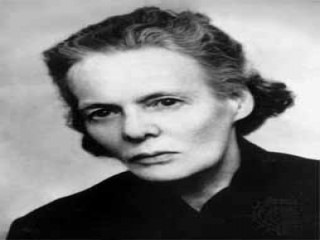
Hilda Doolittle biography
Date of birth : 1886-09-10
Date of death : 1961-09-27
Birthplace : South Bethlehem, Pennsylvania
Nationality : American
Category : Famous Figures
Last modified : 2011-06-15
Credited as : Poet and novelist, ,
Hilda Doolittle was born on Sept. 10, 1886, in Bethlehem, Pa.; her father was a professor. She entered Bryn Mawr College in 1904. She had met Ezra Pound in 1901, and in 1905, while he was studying at the University of Pennsylvania, he introduced her to William Carlos Williams, then a medical school student at the university. She quit school in 1906 because of ill health. During the next 5 years she studied Greek and Latin literature, tried Latin translation, and wrote a few poems. By 1911 the apprenticeship of this tall young woman, attractive in a long-faced, large-eyed way, was nearly over.
Doolittle toured Europe and stayed on in London, where Pound took her under his wing. She and Richard Aldington found a common interest in carrying over into English the spare beauty of Greek art and literature. Pound called them Imagistes, thus creating a new literary movement based on common speech, the exact word, new rhythms, absolute freedom in choosing subjects, clarity, and concentration. Pound helped both poets get published, persuading Doolittle in 1913 to sign herself "H. D., Imagiste." (H. D. remained perhaps the only faithful imagist, less out of decision than because her natural way of writing simply coincided with Pound's program.)
H. D. married Aldington in 1913. In 1916 he left for World War I front lines, and she issued her first volume, Sea Garden, also succeeding him as literary editor of the Egoist. A year later she resigned because of poor health and was replaced by T. S. Eliot. The anxieties of the war, a miscarriage, and her husband's infidelity overwhelmed her. In 1919, pregnant, ill with pneumonia, and saddened by the death of her father, she separated from Aldington and later had a daughter, Perdita.
Winifred Ellerman, a wealthy novelist-to-be known as "Bryher," became H. D.'s friend and benefactor. They settled in neighboring houses in a Swiss village in 1923. Thereafter H. D. lived either in Switzerland or in London. Meanwhile she issued Hymen (1921) and Heliodora (1924). Collected Poems (1925) established her place in modern poetry. "Helen" and the more sustained lament "Islands" are representative selections.
H. D.'s first novel, Palimpsest (1926), deals with the trials of sensitive women and artists in a harsh world. Her second novel was Hedylus (1928). In 1927 she published a verse play, Hippolytus Temporizes. A new volume of poems, Red Roses from Bronze (1931), and The Hedgehog (1936), prose fiction, like her early volumes contained choruses translated from Greek plays. Her most ambitious translation was Euripides' Ion (1937). The following year she divorced Aldington.
H. D. was in London during World War II. By Avon River (1949) deals with Shakespeare and Elizabethan and Jacobean writers. Tribute to Freud (1956) records her gratitude for her psychoanalysis. Her novel Bid Me to Live (1960) is an account of a situation that approximates her marital breakup. Her most ambitious work, Helen in Egypt (1961), concludes that perfect love can be found only in death. She died that year in Switzerland.
In all of H. D.'s poetry, discrete colors and forms, frugal rhythms, focused emotions, and clarity of thought suggest a Greek miniaturist or, in longer works, a Japanese scroll painter.
















